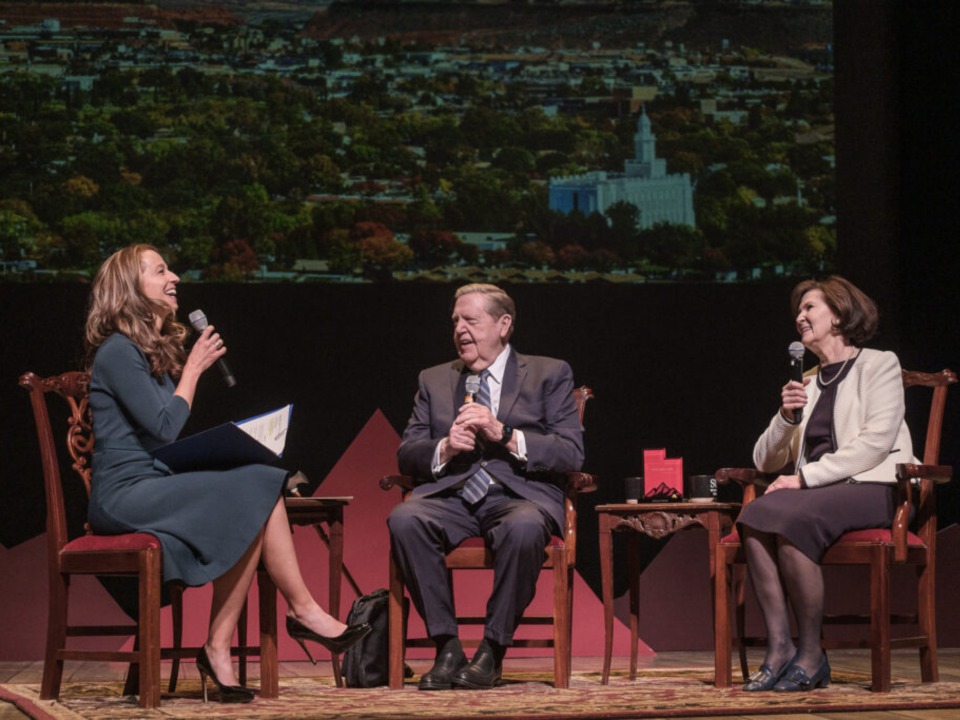
This story appears here courtesy of TheChurchNews.com. It is not for use by other media.
By Sarah Jane Weaver, Church News
CEDAR CITY, Utah — Moments after being honored with the Rural Legacy Leader award during the One Utah Summit at Southern Utah University on October 5, Elder Jeffrey R. Holland turned his thoughts to the poetic prose of Robert Frost.
“The land was ours before we were the land’s. She was our land more than a hundred years before we were her people. She was ours,” he recited.
The poem — recited during the inauguration of U.S. President John F. Kennedy — references rural New England. But Elder Holland of the Quorum of the Twelve Apostles thinks of his own youth in southern Utah when he hears those lines.
As a child, he took for granted the stunning red rock peaks and cliffs of Kolob, Zion and Snow Canyons and Cedar Breaks — all set against a blue sky and the grandeur of the Pine Valley Mountains. He and his wife, Sister Patricia Terry Holland, still feel the pull of those colors and those lands. “Our identity is inseparable with the geology and terrain of southern Utah,” he said.
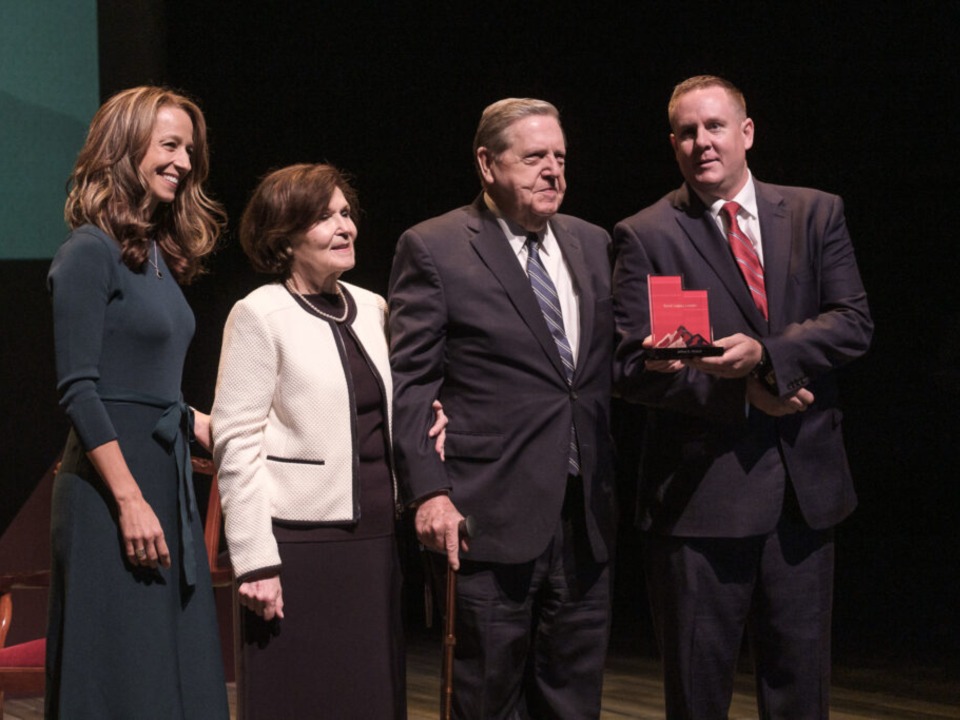
Legacy
Born just 35 miles apart in southern Utah, Elder and Sister Holland were high school sweethearts and married in the historic St. George Temple.
Elder Holland’s mother, Alice Bentley Holland, has pioneer roots in St. George. His father, Frank Holland, came to the area during the Great Depression to find work as part of the Civilian Conservation Corps. As the quartermaster for his CCC group, Frank Holland paid the telephone bill in the office where Alice Bentley worked as a telephone operator. “It was love at first sight. He stayed and Southern Utah became his own.”
Sister Holland spent her youth in Enterprise, Utah, before moving to St. George during her high school years.
The community emphasized small-town values and education; the Hollands grew up working hard. “In one generation, my dad, who had a seventh-grade education, had a son who presided over a university of 30,000 students,” Elder Holland said. “They were hard workers. That is what they knew. By the sweat of your brow you can do a lot.”
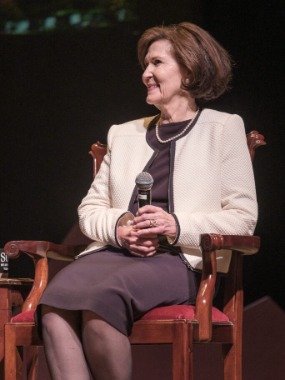
One Utah Summit
The One Utah Summit is a biannual business conference sponsored by Utah Gov. Spencer J. Cox in support of the policy, education and infrastructure needs of rural Utah. The first lady of Utah, Abby Cox, and Stephen Lisonbee, the governor’s senior adviser for rural affairs, presented the Rural Legacy Leader award to Elder Holland. The first lady hosted a conversation with Elder and Sister Holland about their southern Utah roots, titled “Life of a Small-Town Boy: How Growing Up in Rural Utah Shapes a Life.” Elder Holland also participated with a panel of judges at the conference to identify and honor entrepreneurs in Utah.
During his conversation with Utah’s first lady — who is also from rural Utah — Elder Holland acknowledged that, even amid its grandeur and beauty, the geography of the area presented challenges to early St. George pioneers. To the delight of the crowd, Elder Holland read what Latter-day Saint Apostle Parley P. Pratt wrote about the area, dubbed “a wide expanse of chaotic matter.”
“Huge hills, sandy deserts, cheerless, grassless, waterless plains, perpendicular rocks, loose barren clay, dissolving beds of sandstone and various other elements, lying in inconceivable confusion; in short a country in ruins dissolved by the pelting of storms of ages and turned inside out, upside down, by terrible convulsions of a former age.”
Then Elder Holland added: “Welcome to St. George. The ruggedness of the country is still part of the beauty.”
Living amid that landscape meant people had to “make something out of nothing.” Early settlers built their homes and lives on the alkali soil of southern Utah, where hot, dusty wind always seemed to blow. They faced mosquito-borne illness, contended with rattlesnakes and fought back annual floods.
“That meant hard work, that meant no free passes, that meant whatever you got you earned,” he said, speaking of pioneer values that personified honesty, integrity and “how you treat people.”
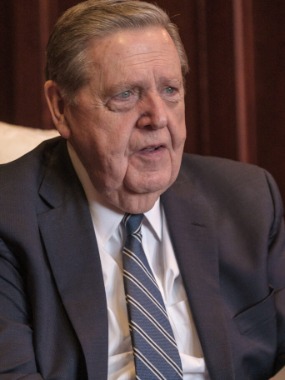
Leadership
The Rural Legacy Leader award honors a leader who has contributed “a lifetime of service, inspiring and touching the hearts of rural Utah.”
Born in 1940 in Washington County, Utah, Elder Holland was lauded in a video presented at the event. His “life and teachings have touched the hearts of all who come in contact with them. As a child, youth and young man raised in southern Utah, he knows what it means to be from rural Utah and how those values lead to a life of success.”
Sister Holland said when Elder Holland served as president of Brigham Young University and the Hollands lived on the BYU campus, she could identify the students from small communities because of the values they personified.
She spoke about the legacy of leadership Elder Holland learned in his youth. She said her mother-in-law knew everyone in St. George and taught her son to relate to other people of every age and station in life. Those in the community treated everyone like family; in many cases they were family.
Answering a question from Utah’s first lady about mentorship, Elder Holland reflected on his opportunities to lead and help others.
“If I had it all to do over again, I would let people make a few more mistakes,” he said. “We underestimate a young person’s ability and we overestimate their experience. What we need to do as leaders is let them benefit from our experience, but let them exercise their ability and their instincts.”
Sister Holland said it is important to be a little vulnerable in leadership.
“My husband learned how to be empathetic and vulnerable from his mother,” Sister Holland said. “She was a wonderful teacher and she allowed him to do a lot more than he remembers.”
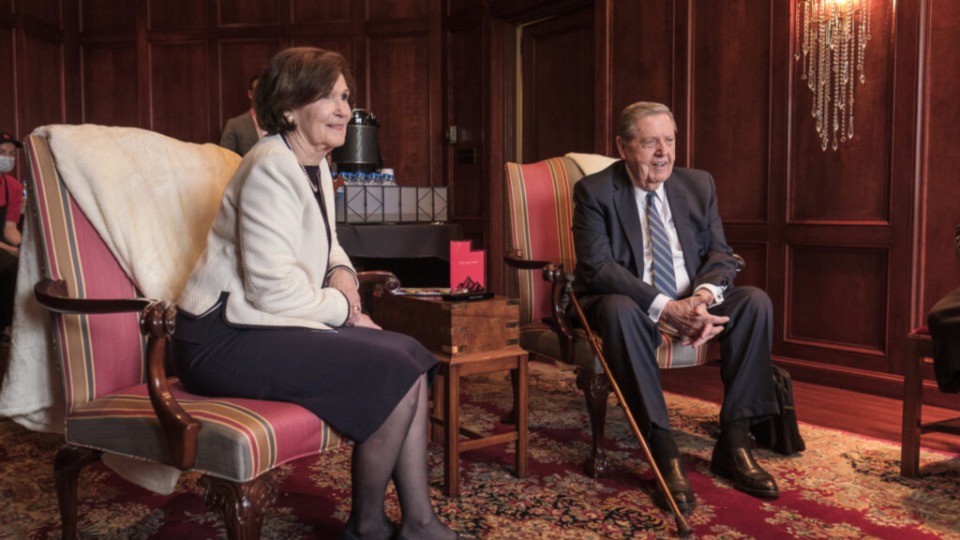
Growth
Personifying the legacy of work and toil and struggle that is part of the Hollands’ southern Utah upbringing is the pioneer legacy of faith that preceded their youth. Brigham Young colonized about 100 communities each decade in the western United States from 1847 to 1877. That pioneering spirit lives on today in the efforts of thousands of Latter-day Saints who are building wards and branches across the globe.
The charge for many of those settlers was to build something where others thought something could not be built. “Here’s some rocks and some lava and some sandstone, and you’re supposed to make something out of it,” Elder Holland said. “Well, that’s about what we tell a missionary — go find somebody, rent a house, hold a meeting and see if you can get the Church going. It happens all over the world.”
In the same way that the Church now has 16.6 million members in areas that dot the globe, the small communities of the Hollands’ youth have also grown and developed. St. George now has a population pushing 100,000 residents and a thriving university, and the Church is building a second temple in the area. Cedar City — the city that was home to Elder Holland’s high school football and basketball rival during his youth — has 35,000 residents, a temple and Southern Utah University, which hosted the One Utah Summit.
“You blink and say, ‘Look at them now.’ You don’t realize the difficult times of the past when people wanted to leave and some did leave. But more importantly, some stayed and fought the good fight.” Elder Holland said. “Now you have universities in those cities with something like the Shakespeare Festival going on right now in Cedar City. These accomplishments are a tribute to people who work hard and make something out of nothing.”
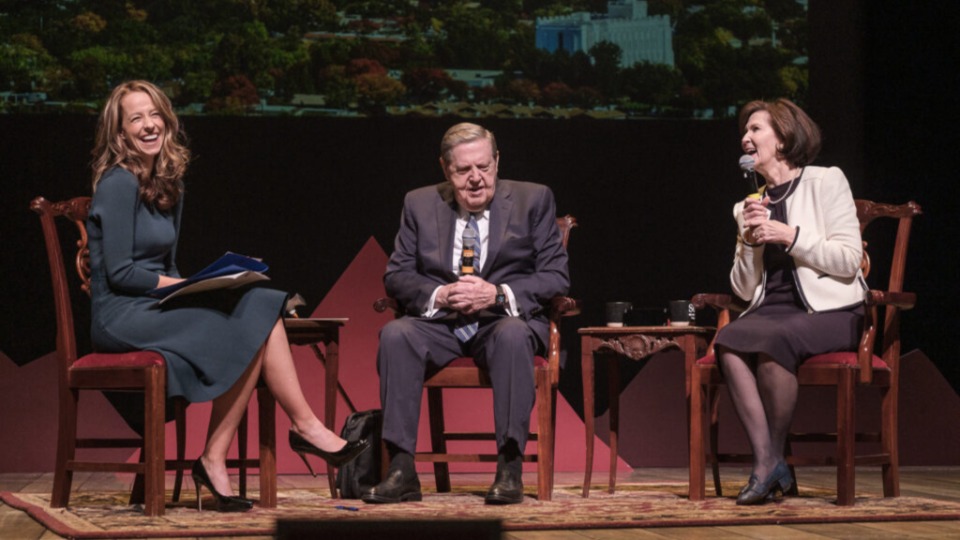
Copyright 2021 Deseret News Publishing Company